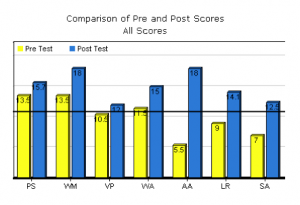The Coffee Talk- A True Tale About A Friend At Wit’s End

Amidst the morning madness of dropping children off at school, I bumped into my friend, Nicole. With watery eyes, Nicole whispered that she “needed to talk,” so we ended up at our favorite coffee house. Over a cup of coffee and more than a few tears, she let it all out. Nicole’s son, James, had been struggling in school since third grade, and she felt she was at her wit’s end and completely exhausted trying to help him!
James was an intelligent, yet floundering, 6th grader who was considered “twice exceptional.” The label meant that while he had a diagnosed learning disability, he qualified as “gifted and talented” at school. James had a diagnosis of ADHD (Attention Deficit Hyperactive Disorder) and he had a reading problem that his mom thought might be Dyslexia. Socially, he had changed. The older James got, the more he became aware and embarrassed of the differences between himself and his classmates. He was the class clown at school, he had limited friends, and his grades consisted of C’s, D’s, and F’s.
Nicole found herself dreading each evening. 30 minutes of homework turned into a marathon, and it was “sheer frustration” for James and his parents. His father, Kevin, knew James was smart and dismissed his problems as “not applying himself and being lazy,” which only caused friction between Kevin and Nicole since they were not on the same page…or even in the same book! In addition, his sister was “negatively acting out to get some of the attention that James was requiring during the stretch of homework time.” To top it off, Nicole questioned her own abilities, since as a credentialed teacher, she felt especially defeated because she couldn’t help her own son with his learning problems.
She sought many avenues to help James—the Resource reading program at school, private tutoring, 12-week attendance at a nationally recognized learning center, medication to control his attention, and counseling to improve his negative attitude and poor self-esteem. His mom saw his potential, but she never saw significant changes with any of the programs.
She confided, “I’ve been resisting coming to Brain Boost Academy because I feel like it’s my last hope! I am so afraid of what will happen if it doesn’t work! I’m just waiting for him to mature and grow out of it! I’m at my wit’s end!”
Our conversation took a more serious tone. She knew how passionate I was to help others, and that I ran a growing learning center. She wanted to know what I knew. She wanted to know what she was missing. I explained objectively how Brain Boost Academy was refreshingly different from tutoring, help at school, and other learning centers.
I began, “since we cover the whole learning continuum, we are able to identify and address the real problem at a deeper and more foundational level. This level is where most of the problems with learning, attention, and communication start! We don’t just identify the area that your child is struggling in, we can tell you why he is struggling in that area, and structure a program to permanently solve the problem!

Picture a tree…if independent and efficient communication and learning are the leaves and upper branches of the tree, then the processing skills are the trunk, and foundational learning, attention, and motor skills, are the roots. Without a strong trunk and root system, the upper branches won’t be sufficiently supported, so learning and communication will be inaccurate and take longer!” We FIX the whole tree, while tutoring, schools, and other learning centers, primarily focus on the upper branches.
I had some more thoughts to honestly share with her, so between answering her questions, acknowledging her frustration, and taking sips of coffee, I gave it to her straight. I shared the 6 most important things that she needed to hear in order to create a better life for James, and to ease the tension and frustration in their entire family…
1. Stop HOPING it will get better and that he will grow out of it!
Children don’t grow out of learning problems, attention problems, or communication disorders. If you do nothing, it will get worse! As school gets harder the gap will widen, and your relationship with your child will continue to be stressful.
2. Stop wasting money on tutoring!
Tutoring is re-learning what should have been learned the first time in school. If a student struggles with a subject longer than 4 weeks, and continues to need tutoring to: learn information, to get through homework, and to study for tests, then there is usually a deeper problem that is causing your child to have to work harder! Stop accommodating the learning problem with temporary band-aids!
3. There is a REASON your child is struggling!
There are many foundational skills that need to be in place in order to learn and communicate correctly, quickly, and easily. Often the learning and attention problem are SYMPTOMS of a foundational problem (in the roots and the trunk of the tree) that needs to be permanently changed.
4. Get a Cognitive Learning Skills Assessment, (or Communication Assessment) at Brain Boost Academy!
- Find out the REAL reason he struggles with attention, reading, learning, and communication.
- Knowledge is empowering! By pinpointing the weak areas, we can create an individualized program targeting exactly what YOUR child needs!
- We will privately sit down with you and explain the test results and the recommendations to help your child. We answer your questions, and we can set a date for the personal Orientation meeting and the program start-date if you choose to take action.
- The testing is a fraction of the cost of other testing centers.
5. Enroll in a Specialized Program at Brain Boost Academy! - All programs are with a Licensed Speech-Language Pathologist or a Therapeutic Learning Coach, and the programs focus on removing the roadblocks to learning and attention.
- All programs are one-to-one and individualized with what YOUR child needs so that no time is wasted and success is faster!
- All programs are structured in a challenging sequence of levels that increase in difficulty while keeping the student just under his frustration point.
- We celebrate each level passed, and students see their progress every hour as they highlight their progress graphs!
- Students enjoy the fun and challenging programs! The programs improve academics, but they don’t feel like school!
- We monitor parent and student feedback weekly and monthly to be sure that changes are observed at home and in the classroom.
- Programs are based on the most effective and evidence-based methods in order to create permanent changes (new neuropathways) in the brain. They combine cognitive neuroscience with close professional support to deliver substantial and lasting benefits!
- What parents really love—the programs are drug-free and produce permanent improvements at school and home and their children and teens actually enjoy coming!
6. Brain Boost Academy consistently produces RESULTS!
- We happily share countless written testimonials, video testimonials, and references, from parents, professionals, and students that support this!
- Stop waiting and wondering if it will work! It’s time to make a change! The road to success can begin with a phone call, an email, or a visit to our warm and friendly office! We really care! What can we do to help you?
- Save your child’s self-esteem! It’s about time he feels good about himself! The stress of having to learn, and pay attention, for 7 hours a day at school, and to then have to endure hours of homework is just too much to take! Once the learning skills are strong, learning is faster and easier, attention improves, and confidence skyrockets. We see this over and over again!
- Improve your family life and the relationship you have with your child! Can you imagine how incredible it would feel to not have the stress of homework time, poor grades, or worry about your child’s future? What is his potential? What would it feel like if you didn’t have to worry about these things?
- Get the understanding and support that you need!
When I asked Nicole if she had any questions, she was staring beyond me at the wall. It seemed like 30 seconds before she responded, “I’m just taking this all in—so are you saying that the reason we didn’t see the changes we wanted in the other programs was because they were working too high in the tree—and that if you found some areas that are weak in the roots and trunk that we should fix those areas first?
I responded with a resounding, “YES!” and a smile! She got it! She mirrored my smile and I could tell in her eyes that her mind was moving a mile-a-minute! I softly assured her, “there IS hope! So don’t wait—and don’t ever give up!” She said she would talk with her husband and that she would like to schedule an evaluation to learn what was holding James back.
The Assessment Results Meeting
Kevin came directly from work and politely introduced himself. Nicole ran through the door 7 minutes late, apologizing profusely. She told me she came directly from the school. They called her to “discuss an incident with James.” With tears in her eyes, she proceeded to tell me that because of his disruptions, his teacher placed him alone, in the back corner of the classroom, away from the rest of the students (whose desks were grouped into fours). Nicole was furious that his teacher made him “feel like a dunce!” Kevin listened, as he stared at his folded arms—almost expressionless.
I shared the test results, and how each area of weakness can negatively impact James’ life academically, socially, and emotionally. The areas of weakness included many areas in the roots and trunk of the tree including: visual processing (how his brain interprets what he sees), auditory processing (how his brain interprets what he hears), logic and reasoning, attention, primitive reflexes, and reading (decoding and comprehension). It clearly explained why James was struggling with reading, attention, organization, and social skills!
About 20 minutes into the meeting, Kevin opened up about his frustrations with his son. He was concerned because he knew that James was smart, but he was also so inconsistent. “He can play video games for hours, but he can’t sit down by himself and do his homework for 10 minutes!” He also shared that when he was a child he “had problems paying attention in school and wasn’t much of a student.”
Nicole and Kevin agreed that the problems they saw with their son matched James’ weak skills that were identified in the assessment. The program recommendations for permanently fixing his weak areas were shared. They recognized that the problems would just continue if they didn’t do anything. After making the decision to get started, I could hear Nicole’s sigh of relief. Kevin, on the other hand, seemed cautious and hopeful about their decision to begin yet another program. Kevin and Nicole set the Orientation Meeting date and the program start date for James to complete a 20-week program.
Twelve weeks later…The Mid-Phase Meeting
During the Mid-Phase Meeting, we reviewed James’ progress in Brain Boost Academy programs, as well as the changes that his parents were seeing at home and school. Nicole’s shoulders looked lighter, and there was a calm about her that she lacked before. Although she was always friendly, I saw more relaxed smiles.
We all agreed that James seemed to mature overnight! Nicole shared, “when I try to look over his homework now, he holds out his hand and says, ‘I’ve got it Mom!’” In addition, he didn’t need constant reminders to “…get dressed in the morning, to brush his teeth, or to get his homework out.” His tests and reports at school overall seemed to be improving. His dad noted, “He can now follow two directions at home without getting side-tracked…and James is trying harder.”
His parents seemed most proud when Nicole shared, “Two weeks ago, another boy from his Scout group invited him over to swim in the pool!” The positive progress in his programs was gradually seeping into his daily activities and everyone felt it!
8 weeks later…The Post-Program Results Meeting
Now it was Kevin who was smiling when he walked into Brain Boost Academy! We knew he noticed positive changes each and every month, since he completed our monthly “Changes To Watch For” checklist. We primarily communicated with Nicole in person since she brought him in and picked him up while his dad was at work.
It was exciting to share James’ program results! He made over a 30-year growth in 7 cognitive and academic areas. His progress averaged out to 5 years of growth in each area in less than 5 months! As you can imagine, this made a big impact on his academics!
His parents shared the biggest changes at home, including independence doing homework, improved overall attitude, increased organization of his materials and his day, and reading (and comprehending what he read) was easier. He began reading magazines and his first novel for pleasure.
With happy energy behind his voice, Kevin said, “His attention for completing tasks has improved immensely! James’ attitude and confidence to try new things has taken off. He is also thinking outside of himself by asking us questions about what we want or we like.” Nicole added, “James is not interrupting conversations at the dinner table anymore either. Even dinnertime seemed like a battle-zone before!”
The biggest changes reported on a form from his teacher at school included, “James is learning along with the class. He doesn’t require constant reminders to pay attention anymore. James seems to have connected with some new friends at school, and he earned a citizenship award for outstanding attitude and participation…his reading and grades have greatly improved…”
Nicole said it a few weeks ago, but felt compelled to say it again, “Thank you for giving us our son back! Thank you for giving me my life back! I have told many friends with struggling kids about our positive experience at Brain Boost Academy.” I reminded her that she and her husband played a big role in the process and “…we all made a great team—after all it takes a village right?”
Kevin added, “It’s as if your Coaches put his brain through “physical therapy”—like the different muscles grew and then connected together to share information easier and faster!” Nicole stated, “No—it was more like you took the no-stick Teflon off of his brain and replaced it with Velcro!” I think they both got it right, and the best part is that the changes are permanent!
The final recommendations included some remedial work to help James with vocabulary and setting up word-problems in math to prepare him for next year. Since he improved his weaknesses in the roots and trunk of The Learning Tree©, he could now work in the upper branches. If we had worked on his vocabulary and math first (upper branches), he would not have had the skills to make necessary connections and to comprehend and remember what he learned. As Nicole said, he would have lacked the “Velcro” needed for the higher-level concepts.
At the end of the program, James wrote, “I liked my classes at Brain Boost Academy and the Coaches. I’m no longer the class clown, and I’m not arguing with my mom as much. I usually follow directions the first time, and a kid in class asked for my help on a science problem! I can think faster and I’m feeling kinda smart!” He read it outloud to me with a proud smile!
On her way out of the meeting, Nicole asked, “Do you remember our ‘coffee talk’ day?” I responded with a nod and she solemnly continued, “You shared your list of the 6 Most Important Things To Know and they led us to where we are today. Thank you!”
I felt the warmth of her appreciation fill me up, and said with sincerity, “Thank you for sharing your wonderful son with us! I cannot tell you how good it feels to see his changes and the ease in your family! That is exactly why I chose to do what I do. Can you join me for a cup of coffee right now? We have a little celebrating to do, and I’m buying!”
Click here to contact Brain Boost Academy

